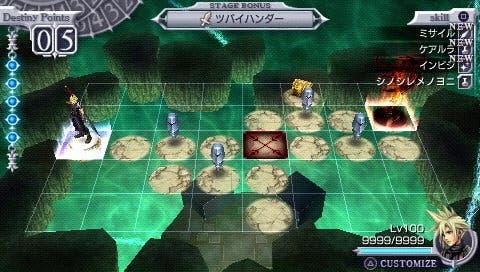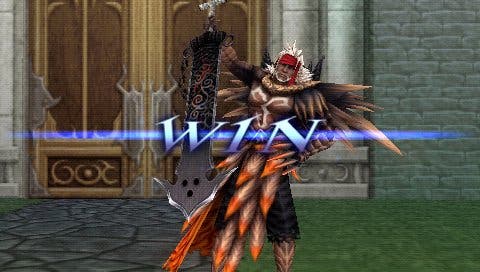Dissidia: Final Fantasy
Final Fantasy meets Final Fight... Finally!
Square Enix has anticipated most first-time players will pick their favourite hero from the PS1 and PS2 generation of Final Fantasy games, as they're some of the most accessible. Indeed, ex-SOILDER Cloud's reliance on close-quarter combos that hurl his opponent against the arena walls for extra damage is one of the easiest styles to master. Other hero highlights include Zidane, a very fast aerial combat specialist and Cecil, who can switch between his Dark Knight and Paladin forms.
On the Chaos side a more focused and tactical approach is often needed to achieve victory. Exdeath is possibly the slowest character in the game, with very little in the way of offensive moves. However, he makes up for it with a reliance on defensive counters, which, if timed precisely, are some of the most effective in the game. A character for beginners he certainly isn't. Dissidia's villains are generally more interesting than their goody-goody counterparts. The Emperor's trap-laying and Cefca's erratic magic styles offer viable alternatives over simply charging in like an idiot with a Gunblade.
As well as a Quick Battle option for one-on-one fights, Dissidia offers a Story Mode, should you feel like helping Cosmos out with her Chaos problem. This begins with a short Prologue where you play as the Warrior of Light (ala Final Fantasy I) and are schooled in the Story Mode basics. Having graduated from this the story splits off into ten Destiny Odysseys where each hero must track down a (drum roll...) "crystal" before the final show down with Chaos.
Each Destiny Odyssey is split into five chapters, and it's all relatively straightforward. You simply move your character piece across each area, with the odd battle or chest along the way, until you reach the Stigma of Chaos tile at the end and proceed to the next chapter. Progression through Story Mode also reveals many cut-scenes and dialogues between the characters. These often build up to the fifth chapter's end fight with the hero's own personal nemesis (Cloud and Sephiroth still don't get on, by the way).
As action-heavy as this new breed of Final Fantasy may be, it just wouldn't feel right without some level of number-crunching. Well, in Dissidia's case you can replace "some level" with "masses", as the level of tinkering available is staggering. Firstly, each character starts out at level one, and by gaining experience through battling, can max up to the level cap of 100. Levelling up not only increases your base attributes but also opens up new moves which can be mapped to analogue and attack button combinations.

As well as new moves, levelling up also unlocks new abilities. These come in Action (increased speed, extra jumps), Support (automatic lock-ons, EX Burst commands) and Extra (better criticals, ability counters) flavours. Every move and ability costs a certain amount of points from your character's max allowance. Spending time in the menus is the best way to tweak a character towards your preferred style of play. Yet more customisation options are available through Equipment and Accessories, which doesn't change your character's physical appearance but does greatly enhance their stats and open up yet more tactical options.
Apart from Chocobo wings and Moogle hats, which other Final Fantasy mechanics have we yet to talk about? Ah yes, the Summons. There are over 50, ranging from Alexander to Ultimate Weapon, and they can be equipped to a character one at a time, and activated in a bout either manually or automatically, triggering different BP bonuses. Bahamut steadily increases BP for a short time, whereas Cactuar lowers the enemy's BP by 1000 points.
Dissidia contains more Final Fantasy nostalgia than a week-long cosplay convention. In addition to Gil, battling also earns PP which can be spent, funnily enough, in the PP catalogue. Not only is this the way to unlock the Chaos characters for player use, but PP can also be spent to unlock each character's alternative costume. Cloud gets his Advent Children threads and Squall gets all old-school in his classic SeeD uniform.

Without all the number-crunching Dissidia feels like a solid PSP fighter with interesting combat mechanics and a varied character roster. With them, however, it has an insane amount of depth that will appeal to both dexterous fighter fans and more methodical RPG purists. It's not quite an Armored Core level of pre-bout engineering, but the possibilities of customisation grow steadily as you progress your character along.
Dissidia certainly isn't without its faults. The rate of descent once airborne is too slow, and the combat fundamentals occasionally feel jerky compared to more traditional and refined fighters. But these minor criticisms aside, it's a very accomplished fighter that's worth your time - whether you're a fighter nut or Final Fantasy fan. But if you've only played Final Fantasy VII, just be sure to try a character other than Cloud and Sephiroth.
Dissidia: Final Fantasy is out now and Japan and should be released in Europe later this year. You'll need a good translation guide to play it on import.

